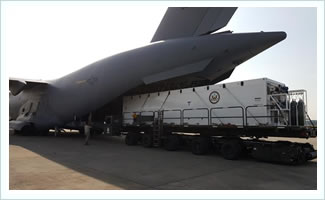
Founded in Kansas City in 1944, MRIGlobal’s headquarter remains here, while its work has global impact.
The Ebola Crisis of 2014-2015 exemplifies MRIGlobal’s impact on world health. When the World Health Organization declared the West Africa Ebola outbreak a Public Health Emergency of International Concern in August of 2014, MRIGlobal was firmly engaged on two fronts: mobile labs and medical transport units.
MRIGlobal collaboratively supports the U.S. Government in worldwide health and security solutions. Since 2002, that support has included designing, building, equipping, and staffing field-based mobile laboratories. With MRIGlobal’s diagnostics expertise, international relationships, and logistics savvy borne of serving in 19 countries, MRIGlobal staff and mobile labs deployed, delivering reliable diagnostics critical to abating the crisis in West Africa.
As the Ebola outbreak devastated West Africa and threatened global health, the U.S. Department of State, with private funding from the Paul G. Allen Ebola Program, contacted MRIGlobal for additional help.
MRIGlobal’s mission: Create a reliable, flyable medical transport unit to evacuate patients to clinical centers for life-saving treatment while maintaining full biocontainment.
In just 191 days, MRIGlobal designed and fabricated two Containerized Bio-Containment System (CBCS) units. Watch the time lapse video here.
The CBCS is state of the art, next generation, flyable medical transport unit with full biocontainment. Although the CBCS was initially intended for containment of Ebola, it was designed to manage all types of highly pathogenic organisms, whether from outbreaks or catastrophes. The units can be used for transport or to isolate on-site patients who need diagnostics and treatment.
Flyable in both private and military aircraft, pilots can transport the CBCS in their cargo bays, confident that the biocontainment is safe and effective. CBCS units can be moved by truck, too, ready for use anywhere.
With MRIGlobal’s CBCS units and mobile labs deployed throughout the world, global health is better prepared to withstand threats and disasters.